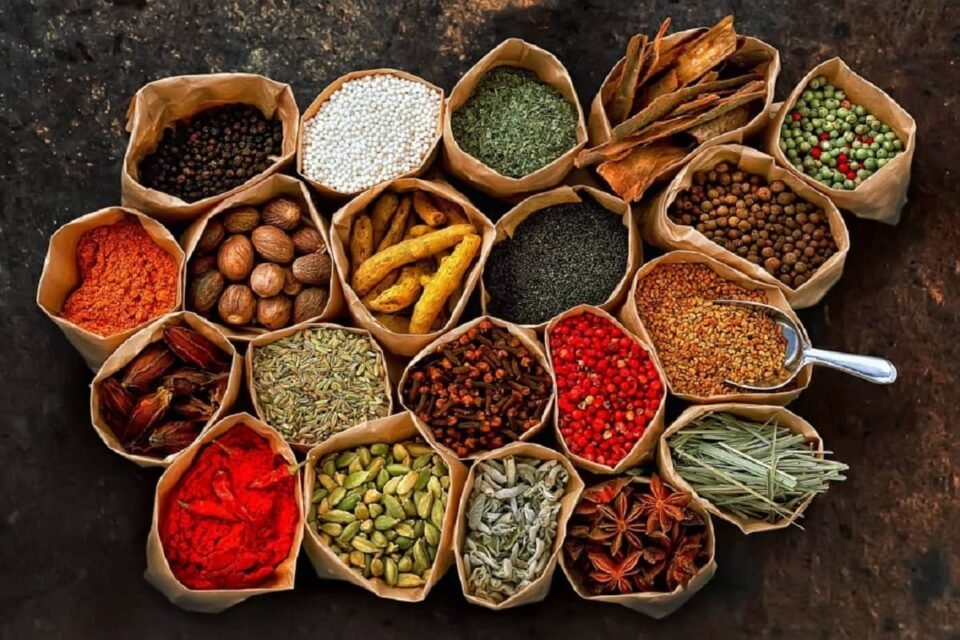The kitchen should be just as healthy as the rest of the home. It should have healthy ingredients that enhance the taste and keep us healthy!
Many herbs and spices have multiple health benefits. Some include cognitive boosters, anti-inflammatory properties, and the potential to fight cancer. These herbs and spices include ginger, peppermint, and turmeric.
The ancient Greeks used many herbs and spices for their healing properties long before modern medicine. For example, Hippocrates (460-377 BC) used saffron.
Many still use cinnamon, thyme, and coriander as natural remedies for fevers, aches, and pains.
Although there is not much scientific evidence to support their effectiveness in treating serious illnesses, increasing research shows that some herbs and spices may be able to reduce certain symptoms.
10 Herbs and Spices Health Benefits
This article will discuss the health benefits of 10 herbs, including ginger, peppermint, and turmeric.
We have highlighted some Herbs and Spices Health Benefits in this article. Continue reading to discover healthy and delicious spices for your home.
#1. Ginger
Ginger is a superfood because of its gingerol content, which is good for our health. It is also an antioxidant and has anti-inflammatory properties. It is also used in medicine in many Asian countries, including China.
If you are talking about the taste of ginger, no other spice can match its flavor. Ginger can make a difference in hot soups and spicy foods.
It can be used in stir-fry, curry, or tea. You can also make ginger lemonade with it.
They can relieve us of digestive problems and prevent nausea. It has many well-known benefits. It also reduces muscle soreness and pain. It is also a great home remedy if you suffer from a cold.
Ginger will make any chronic indigestion disappear. It is essential for osteoarthritis patients. Ginger is the perfect food for our stomachs, with its many benefits.
#2. Turmeric
While turmeric is a great spice for health and flavor, it can cause problems if you wear a white dress to eat a meal that includes turmeric. Your white dress could permanently turn yellow if not for the turmeric stains.
Curcumin, a yellow pigment found in turmeric, is extremely useful in preventing inflammation. Chronic inflammation is a key factor in many diseases, such as arthritis, chronic pain and heart disease, diabetes, cancer, metabolic disorder, and other digestive-related problems.
Because curcumin cannot be absorbed directly by the body, it can be combined with piperine (found in black pepper) to aid our bodies absorb it. Turmeric is a powerful antioxidant and anti-inflammatory that can help fight many diseases.
Other benefits include:
- Lowering the risk of developing diabetes.
- Improving brain function.
- Fighting cancers such as breast and skin cancer.
It is also an antidepressant spice.
#3. Cinnamon
Since cinnamon has been used for centuries as a medicine, it has proven effective in treating heart disease.
It can also treat heart disease, blood pressure, and other conditions like poor metabolism, blood sugar, and cholesterol. In addition, it can be used for any type of diabetes, high or low.
Two types of cinnamons are available: Ceylon and Cassia. Cassia is the best and contains a lot of coumarins. It can cause serious side effects if you consume too much coumarin.
However, it is easy to find in your local supermarket and not too expensive. Ceylon cinnamon is safer than regular cinnamon and does not contain too much coumarin.
It is an antioxidant and anti-inflammatory, just like turmeric and ginger. It is an antioxidant that can improve brain function, prevent food cravings, and can be used to help fight obesity.
Cinnamon can be added to your coffee, fruit, and yogurt. It can also be used in yogurt, fruits, and coffee. In addition, it can be used in stew and tagine.
If you ever find yourself with any health problem (I hope it doesn’t!) These amazing spices are worth it! Remember to use them in your meals, so you feel better.
#4. Cumin
Cumin is a well-known cooking spice that is known for its aroma. It is beneficial for weight loss, cholesterol management, and stress management, among other things. It is also high in antioxidants.
Cumin is anti-diabetic in research. Eighty people used an Ayurvedic formula containing cumin for 24 weeks. As a result, their postprandial blood sugar levels were significantly lower.
#5. Peppermint
Peppermint, a popular herb used to flavor foods and drinks in Asia and Europe, is a well-known flavoring agent. These regions used peppermint before modern medicine to increase their digestive health, cooling, and antibacterial properties.
Peppermint, which acts as a bronchodilator and is a holistic treatment, is effective in improving the health of the heart and lungs.
Bronchodilators increase the air passages (bronchioles) in the lungs. Inhaling peppermint aroma will increase the nasal air force and supply more oxygen to the lungs.
Peppermint can also be used to relax muscles, according to some studies. This is why menthol is commonly found in creams and ointments that target muscle pain.
#6. Echinacea
Echinacea, a supplement derived from the coneflower plants, is well-known for its ability to boost immunity and prevent colds.
Although research has not proven that the herb is capable of fighting viruses, many people use Echinacea for conditions like:
- The common cold
- Upper respiratory infections
- Bronchitis
- influenza
- inflammation
- Ear infections
- vaginitis
- yeast infections
These treatments with Echinacea are not shown to be effective. Most studies are inconsistent or inconclusive.
Although there may be a slight correlation between taking Echinacea to strengthen the immune system, most evidence for its efficacy is speculative.
#7. Chili powder
Research from 2015 suggests that capsaicin (the phytochemical that makes chili powder hot) may play an important role in regulating the heart and metabolic health.
Chili powder triggers positive protein changes that promote weight loss. Researchers are still not sure how this mechanism works. Participants in a 12-week study that involved moderate chili consumption experienced weight loss.
This was due to chili’s ability to control insulin and other therapeutic effects. Researchers found that chili consumption significantly decreased abdominal fat (fat) and increased appetite.
Recent research by the American Heart Association has shown that chili powder consumption may have 26% less risk of developing heart disease.
In addition, regular chili consumption is associated with a 25% decrease in death from any cause and 23% fewer deaths from cancer.
Chili powder’s anti-inflammatory properties could make it an effective treatment for arthritis. It can also help to reduce muscle and joint inflammation.
#8. Parsley
The Mediterranean region is where parsley originated. Many people have used it over the years to treat various conditions, including allergies and high blood pressure.
The herb is rich in antioxidants, carotenoids, and other vitamins that support a healthy immune system and body. In addition, vitamin K is an important nutrient that promotes bone health.
#9. Oregano
Oregano is another herb that is a common part of the Mediterranean diet. It is used as a flavor enhancer and an aroma oil supplement. Its antioxidants are responsible for its strong taste and aroma, as well as providing benefits such:
- The immune system strengthens against infections
- reducing inflammation
- Regulating blood sugar
- Insulin resistance can be improved
- Menstrual cramps and symptoms of the urinary tract
- fighting cancer
These results cannot be achieved by Oregano alone. However, people may still use it because of its antioxidative benefits that can be beneficial for many conditions.
#10. Cardamom
Cardamom, another spice that has many health benefits, is also available. Cardamom is a spice that comes from the seeds of ginger plants. It can be used in teas such as chai, iced teas, desserts, and even savory dishes.
- Constipation
- colic
- diarrhea
- Dyspepsia
- vomiting
- Kopfschmerz
- epilepsy
- Cardiovascular disease.
The healing properties of the spice are largely due to a combination of volatile oils, fixed oils, and phenolic acid. The volatile oils in cardamom seeds are anti-inflammatory, anti-microbial, analgesic, and antispasmodic.
Cardamom supplementation may help lower cholesterol and obesity in animals. For example, cardamom supplementation lowered total cholesterol and triglyceride levels in obese rats.
Summary
Spices and herbs are delicious additions to food, but they also provide essential nutrients that can greatly benefit the body. Although some people may notice health improvements or benefits from herbs and spices in their diets, they should not be relied upon for complete treatment. Talking to a doctor is advisable for those with serious medical conditions.
For More Latest Diet Foods Updates and Information about herbs and spices health benefits visit Diyusfitness and Follow Us on Twitter.






